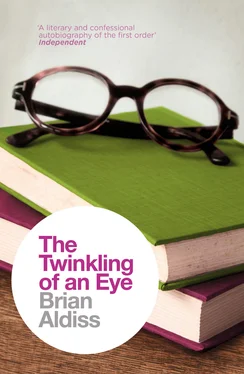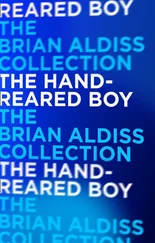Improvised shower cubicles spurted salt water while we assaulted our bodies with salt-water soap. Emergency urinals – little more than raised troughs – had been clamped on to the Boat Deck. To their notice, NOTHING TO BE THROWN DOWN THESE LATRINES, a wag had prefixed the words IT IS.
By this time, we knew there could be but one destination for us. Burma.
We disembarked on Bombay docks in September 1944. Looking back at the grey walls of the ship, I realised that it had become a kind of womb after thirty days afloat; in the end, we had grown so dependent upon it that we were reluctant to leave.
‘Bags of bull, lads!’
Ever obedient to the sergeant, our platoon got fell in and marched to Bombay’s Arabian Nights -cum-Keble-College railway station.
At the cavernous station we had an hour’s wait for our train. An hour to look, to stare, even to speak! The brightness of everything, the nervous energy of the stringy brown men, selling and begging. Here a thousand worlds seemed to be contained, with fascinations inexhaustible.
Our train slunk into its designated platform and we climbed aboard, humping our kit. A whistle blew. We had three hundred miles to go, to Mhow, in Central Provinces.
I described it in a letter home.
We travelled third class on the train. What coaches! – Wooden, ramshackle, a square box for a compartment, ten feet by ten feet, and the seats made for a race that slept on nails. No window glass, no spitting allowed. Eight bells sound, the natives scream, the train gives a compulsive jerk forward …
Night swooped down. We smeared anti-mosquito cream on hands and face, and rolled down our sleeves. The winged wildlife of the place soared in and cavorted round the light. From the darkness came hoarse croaks of bullfrogs and the high-speed Morse of crickets.
A considerable portion of the native population sleeps on the stations. They burn herbs which smell strange and musky – whether pleasant or foul you can’t quite decide.
We fell asleep uncomfortably, one way or another. When I awoke it was dawn and the sun, donning rouge and roses, climbed back to heaven. Allah be praised! We wiped the mozzy ointment off.
The train clattered through rocky ravines, tree-covered land, wide plains. Strange trees, tropical birds. Parrots and monkeys we saw in the wilder parts. Round the villages cluster padi fields, maize, and what-have-you. The beasts of burden are humpbacked cows, oxen, and sturdy black water buffalo, which wallow in mud holes when they get the chance.
The further we travelled into the interior, the greyer grew the rags and clothing of the people, and the fouler and more frequent became the beggars. We saw old vultures, hawks, and lizards a foot long. Goats roamed the stations. All these attractions palled as we became dirtier, hungrier, and more tired.
It poured with rain, steady beating rain, a reminder that the monsoon was not yet over. We put up the shutters. Night fell, and still it rained.
It rained when we reached Mhow station. Hauling our kit – kitbags, mosquito nets, blankets, big packs, respirators, rifles – we crossed the station to where lorries awaited us. We bumped over to the cantonment …
The rain stopped and the night smelt good. In the dim lighting our quarters seemed like a palace: paved floors, lofty ceilings, white paint. By morning light it looks more like a barn!
It’s all very fascinating. Tomorrow I hope to look over the village, which seems quite large. We shall spend a month here.
In short, everything’s fine, mighty fine.
The train journey to Mhow was the first of many journeys, since the train was such a feature of Indian travel at the time. However long, however arduous the journeys, the spectacle of India itself mitigated the tedium.
Mhow, the village, is best remembered in its picture-postcard aspect, when strident day suddenly marries velvet night and the flying foxes, waking in the tall acacias, take flight for distant fig trees. Summer lightning flickers all round, flirting with the horizon, nervy, noiseless. Then kerosene lamps on stalls lick their yellow tongues, making the bazaars enigmatic. Weird music crackles from radios, and a whole new mystery envelops the world.
In Mhow was a Signals training centre, designed to toughen us up after the voyage, in preparation for more arduous times in Burma. Oh, the wriggling and conniving, the malingering, which went on among men who wished to avoid action in Burma at all costs – including, presumably, a cost to their self-esteem. You see clever soldiers who have found a rock to cling to – barnacles with a job in the quartermaster’s stores or service as an orderly in the hospital. Others, perhaps, become base wallahs and box wallahs in New Delhi, to serve out a safe and boring war, until it is time to return home with a Long Service medal and nothing to report. Anything, rather than be involved with the shooting war further east. My own attitude was that the dice should be allowed to fall where they would. This time was an awakening for me, as no doubt for many others. Such personal matters were never discussed. But I had left behind, not only England, but an inadequate earlier self, as the times demanded.
Much in the Army was startling, not least the chorus of complaint that rose on every side about everything. Many older men had been wrenched from jobs or marriage. They resented a violent disruption to their lives; whereas for me the East was life, life at last.
For me, novelty overrode any discomfort. The pre-dawn runs, the petty restrictions, the training, the shouting, caused me little pain: I had survived ten years in boarding schools under rather worse conditions. For this at least the public-school system could take credit: it accustomed one to hardship and injustice.
The war for many provided a kind of release from personal problems. The question bothering humanity, or an intellectual fraction of it, at least since the days of the ancient Greeks, was summarised by H. G. Wells in the touching title of one of his books, What Are We to Do with Our Lives? This dilemma was resolved, or at least shelved, by hostilities. Family conundrums were of no moment when one was issued with a Sten gun.
It is this kind of effect that makes war so popular.
Japanese military operations had been widely successful in the Far East. Events unravelled rapidly after the bombing of Pearl Harbor on 7 December 1941.
Hong Kong fell on Christmas Day. On 15 February 1942, the supposedly impregnable base of Singapore fell to a Japanese army. Thirty thousand Japanese confronted 85,000 British and Commonwealth troops. Shortly before the end, General Perceval, in command of the Singapore garrison, sent a message to Churchill in England: ‘Have 30,000 rounds of ammunition. What shall we do with it?’ Churchill cabled back: ‘How about firing it at the enemy?’ The suggestion was not carried out. Perceval surrendered, delivering the Commonwealth troops to a bitter imprisonment. A black day for the British Empire.
Two Japanese divisions had already advanced into Burma. Mandalay was taken in May of that year. Disaster and disillusion followed.
The Japanese became regarded as invincible, while their cruelty to the Chinese and other races who fell under their control was such that they were regarded almost as a sub-species of the human race. Their ability to live and fight in dense jungle caused the British to regard them as superhuman.
Clearly, the war in Europe was to be preferred as a theatre in which to fight. Death rates for prisoners captured by German and Italian armies amounted only to some four per cent, whereas under the Japanese the rate was twenty-seven per cent – higher still on the notorious Death Railway.
At this distance in time, it’s hard to recall the particular hells conjured up by the very name Burma. Our attitude towards the Japanese was compounded of a toxic mix of reality and racism.
Читать дальше












